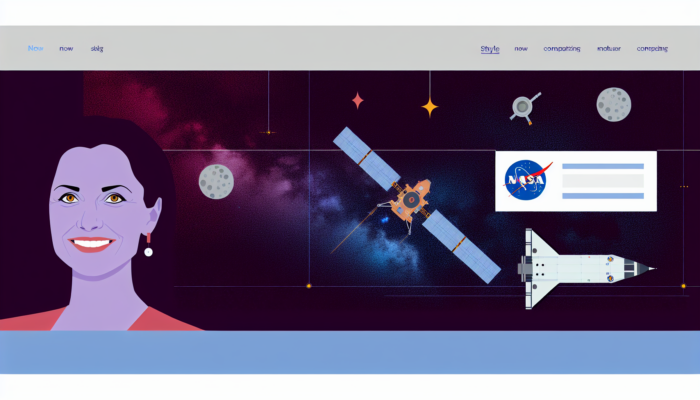In a world where dreams are often just that—dreams—there exists a realm where they can transform into reality. For many, the thought of working with NASA evokes images of futuristic technology, groundbreaking discoveries, and the vastness of outer space. But what if I told you that you could be part of this extraordinary journey? This is not just a fantasy; it’s a tangible opportunity for those with the right skills and determination. Join me as we explore the fascinating opportunities at NASA and how you can become a part of this incredible legacy.
The Allure of NASA: A Gateway to the Stars
Nobody can deny the allure of NASA. The National Aeronautics and Space Administration has always been synonymous with exploration and innovation. With missions that range from sending humans to the Moon and Mars to exploring distant planets and phenomena, NASA captures the imagination of millions. But what draws people to this iconic institution isn’t just the thrill of space travel; it’s also the chance to contribute to something greater than themselves.
Imagine waking up each day knowing that your work contributes to humanity’s understanding of the universe. Whether it’s designing spacecraft, developing cutting-edge technology, or conducting scientific research, each job role at NASA plays a crucial part in pushing the boundaries of what’s possible. So, how do you become part of this elite group?
Understanding the Roles at NASA
NASA offers a variety of career paths that cater to different interests and skill sets. From engineers to scientists, and from administrative staff to support roles, there’s something for everyone. Here’s a closer look at some of the key roles available:
1. Engineers: The Builders of Spacecraft
Engineers at NASA are the masterminds behind the designs and constructions of spacecraft and satellites. They work on a multitude of projects, ensuring that every component is optimized for space travel. Whether you’re a mechanical, electrical, or aerospace engineer, your skills can contribute to missions that redefine our understanding of the cosmos.
2. Scientists: The Explorers of Knowledge
Scientists at NASA are tasked with analyzing data gathered from missions and experiments. They study everything from the geological makeup of Mars to the effects of microgravity on human health. If you have a background in physics, biology, or chemistry, your expertise could play a vital role in groundbreaking research.
3. IT Specialists: The Tech Wizards
As technology advances, so does the need for IT professionals. NASA requires talented individuals to manage their vast networks, data systems, and cybersecurity measures. If you’re tech-savvy and enjoy problem-solving, a position in IT at NASA may be your calling.
4. Administrative Roles: The Backbone of Operations
Behind every successful mission is a dedicated team of administrative professionals. From human resources to finance, these individuals ensure that the organization runs smoothly. If you have strong organizational skills and a knack for management, consider pursuing a role in administration at NASA.
Is a Degree Required to Work at NASA?
One of the most frequently asked questions is whether a degree is necessary to work at NASA. The answer is that while many positions do require advanced degrees, there are also opportunities for those without one. NASA often seeks interns and co-op students, which can provide invaluable experience and sometimes lead to full-time employment.
Fortunately, numerous programs can help you get your foot in the door. NASA’s internship programs are designed for students and recent graduates, allowing them to work alongside professionals in the field. These internships often lead to networking opportunities that could prove invaluable for your career.
The Importance of Internships and Entry-Level Positions
Internships and entry-level positions are crucial stepping stones to a successful career at NASA. These roles provide hands-on experience and allow you to understand the inner workings of the agency. Not only do they enhance your resume, but they also help you build connections with experienced professionals.
Many NASA interns have gone on to secure full-time positions within the agency. This pathway is a testament to the importance of seeking opportunities that may not seem immediately lucrative but can lead to long-term career success.
Networking: Building Connections for Success
As with many fields, networking plays a pivotal role in securing a position at NASA. Attending industry conferences, joining relevant professional organizations, and connecting with current or former NASA employees can open doors. LinkedIn, for example, is a valuable tool for connecting with professionals in your field of interest.
Networking isn’t just about finding job opportunities; it’s also about learning from others’ experiences. Engaging with professionals can provide insights into the hiring process, company culture, and essential skills that you may need to develop further.
Preparing for the Application Process
Once you’ve identified your desired role at NASA, it’s time to prepare for the application process. Here are some key steps to ensure your application stands out:
1. Tailor Your Resume
Your resume should reflect your skills and experiences relevant to the position you are applying for. Highlight any projects, internships, or coursework that demonstrates your capabilities. Make sure to use keywords from the job description to enhance your chances of passing through applicant tracking systems.
2. Craft a Compelling Cover Letter
Your cover letter is your opportunity to showcase your passion for NASA and explain why you are a perfect fit for the role. Share your enthusiasm for space exploration and how your background aligns with NASA’s mission. Don’t forget to personalize your letter for each position you apply for.
3. Prepare for Interviews
If you’re selected for an interview, congratulations! This is your chance to shine. Research common interview questions for your desired role and practice your responses. Be prepared to discuss your experiences and how they relate to the position. Show your passion for NASA and your eagerness to contribute to its mission.
The Future of NASA: Opportunities Abound
As NASA continues to expand its horizons, so do the opportunities for aspiring professionals. With plans for lunar missions, Mars exploration, and the development of new technologies, there has never been a more exciting time to consider a career at NASA. The agency is constantly on the lookout for talented individuals who can contribute to its various projects.
Moreover, NASA is committed to diversity and inclusion, actively seeking candidates from all backgrounds. This commitment ensures that the agency benefits from a wide range of perspectives and ideas, fostering innovation and creativity in the workplace.
Exploring Private Sector Opportunities
While NASA is a government agency, the space industry is rapidly evolving, and private companies are becoming increasingly involved in space exploration. Companies like SpaceX and Blue Origin have opened up new avenues for employment in the aerospace sector. If you’re interested in working in space travel, consider exploring opportunities with these private firms as well.
Many of the skills required for NASA jobs are transferable to the private sector, so keep your options open. Working with a private company could provide valuable experience that would make you an even stronger candidate for NASA in the future.
Conclusion: Your Journey Awaits
In conclusion, working at NASA is not just a dream; it’s a viable career path for those willing to put in the effort. By understanding the various roles available, preparing for the application process, and networking with industry professionals, you can position yourself for success. Whether you’re a recent graduate or looking for a career change, the opportunities are vast and waiting for you. The cosmos is calling—are you ready to answer?
“





